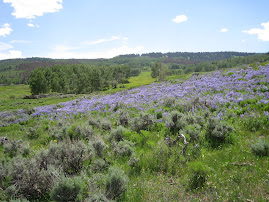Apr 28, 2009
2 views
There seem to be two different views of afterlife.
First is the familiar Western view, which as I understand is to live life as the individual I am and try to do the best I can, basically believing and following what someone else says is the best way, be it book, church, or preacher. And the best way? To practice virtue. Then when I die, if I have practiced enough virtue, I go to heaven, where I (as an individual) experience what is described as the presence, vision, or knowledge of God. Since God is love, the experience for me must be nice indeed. The great thing about this view is that it retains ego (I get to survive!). Comforting feeling for the ego to have.
Whereas in the East (as well as in Haiku God theory), my ego, my nature, is at root nothing more nor less than “God” (as the holy spirit). So the point of life is to discover this original nature (our face before we were born) and then become it. And since this original nature is not-I (unity/love), to discover it I must transcend I, (ego/separateness) and actually become not-I. This would be true heaven indeed. And the way? To practice virtue.
So the big difference is the perceived end of the practice of virtue. In the West, I will survive. In the East, I don't. I drop away. And I can do it today - no need to wait til death. Of course if I did manage to drop away today, what would be left? A saint. And who wants to be a saint? I sure don't. Doesn't seem like it would be much fun. I like being I.
e
First is the familiar Western view, which as I understand is to live life as the individual I am and try to do the best I can, basically believing and following what someone else says is the best way, be it book, church, or preacher. And the best way? To practice virtue. Then when I die, if I have practiced enough virtue, I go to heaven, where I (as an individual) experience what is described as the presence, vision, or knowledge of God. Since God is love, the experience for me must be nice indeed. The great thing about this view is that it retains ego (I get to survive!). Comforting feeling for the ego to have.
Whereas in the East (as well as in Haiku God theory), my ego, my nature, is at root nothing more nor less than “God” (as the holy spirit). So the point of life is to discover this original nature (our face before we were born) and then become it. And since this original nature is not-I (unity/love), to discover it I must transcend I, (ego/separateness) and actually become not-I. This would be true heaven indeed. And the way? To practice virtue.
So the big difference is the perceived end of the practice of virtue. In the West, I will survive. In the East, I don't. I drop away. And I can do it today - no need to wait til death. Of course if I did manage to drop away today, what would be left? A saint. And who wants to be a saint? I sure don't. Doesn't seem like it would be much fun. I like being I.
e
Apr 7, 2009
Forgetting
Ever had the feeling you've forgotten something – something important? And for days, months, years, it's there, nagging. I've have that feeling, and I know what I have forgotten – my face before I was born. I just wonder if I can remember it before I die. Or does it really matter?
e
e
Apr 6, 2009
New Commentary
For any Haiku freaks, a new commentary of 24 verses has been added at the bottom of the page to further obfuscate the theory.
e
e
Subscribe to:
Comments (Atom)




